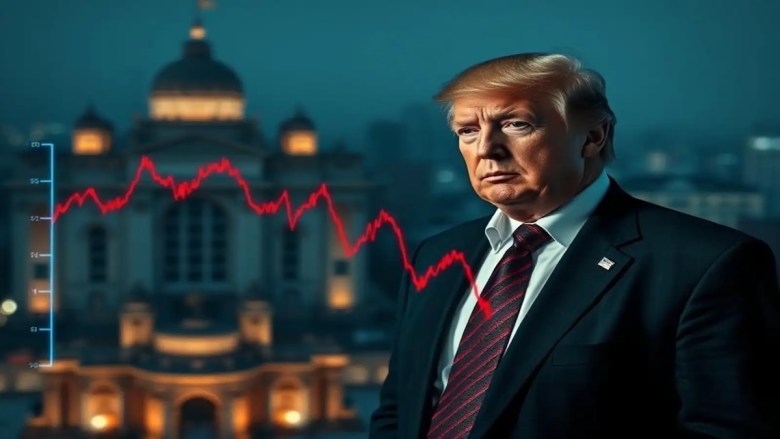Business
Global Economy Faces Turbulence as U.S. Retreats from Leadership

The global economy is at a crossroads, facing the potential for a severe financial crisis as the United States steps back from its traditional leadership role. The current landscape, marked by rising populism and economic uncertainty, raises concerns about the implications for international stability.
Historically, globalization has faced criticism primarily from the left, arguing that its benefits have disproportionately favored wealthier nations while exacerbating inequalities in poorer countries. Critics like economist Joseph Stiglitz and activist Naomi Klein have highlighted how globalization has often benefited U.S. corporations at the expense of both American workers and developing nations. Following the financial turmoil in 2008, widespread protests and calls for protectionism gained traction, reflecting a growing skepticism towards globalization.
The rise of populist sentiments, particularly under former President Donald Trump, has transformed these critiques into radical economic policies. Trump’s administration emphasized protectionism and tariffs, signaling a departure from the multilateral cooperation that characterized previous U.S. policies. This shift has significant implications for global trade and economic dynamics, as the U.S. withdraws from international economic institutions like the World Trade Organization (WTO).
China and the European Union: Unlikely Successors to U.S. Hegemony
In the quest for a new global leader, China and the European Union emerge as the primary candidates. However, both face considerable challenges. While China has become a manufacturing powerhouse and the world’s largest exporter, its economy is hampered by imbalances, including a weak consumer sector and high levels of state ownership in financial institutions. Furthermore, China’s authoritarian governance structure limits its ability to gain the cultural and political acceptance necessary for global dominance.
The European Union, despite being a significant economic bloc, struggles with internal divisions and lacks the cohesive political will to challenge the U.S. on a global scale. The fragmented nature of the EU’s financial system and its reliance on national regulations hinder the euro’s potential as a viable alternative to the U.S. dollar.
As the U.S. contemplates its role, the country’s soaring national debt—projected to reach 134% of GDP by 2035—casts doubt on its capacity to reassert itself as the dominant global power. The fiscal policies initiated during Trump’s tenure have exacerbated this situation, raising concerns about the sustainability of U.S. economic leadership.
The Risks of a Leaderless Global Economy
The absence of a clear global hegemon could lead to instability reminiscent of the interwar period. Historical precedents, such as the collapse of the international economic order following World War I, highlight the dangers of a fragmented global landscape. Economic crises have a history of triggering political upheaval and social unrest, as seen in the 1930s when the Great Depression fueled the rise of extremist movements.
Today, financial analysts warn that a collapse of the U.S. Treasury bond market—valued at over $30 trillion—could precipitate a crisis on a scale not seen since 2008. The bond market serves as a cornerstone of global financial stability, and its destabilization could lead to soaring interest rates and a loss of confidence in the U.S. dollar.
Recent warnings from officials, including Kristalina Georgieva, head of the International Monetary Fund (IMF), underscore the urgent need for global cooperation in addressing these challenges. The interconnectedness of today’s financial markets means that a crisis in one region can have far-reaching consequences.
As the world grapples with these issues, the potential for a new financial crisis looms large. The lessons of the past suggest that without a strong leader to guide international economic policy, the risks of conflict and instability will only increase. The United States, once a beacon of global economic leadership, now finds itself at a critical juncture, with the future of the international system hanging in the balance.
In conclusion, the current trajectory suggests that the absence of a dominant global power could lead to a precarious economic environment. The interplay of rising populism, economic protectionism, and the decline of traditional leadership roles presents a complex challenge that requires urgent attention and coordinated response from nations worldwide.
-

 Lifestyle4 months ago
Lifestyle4 months agoHumanism Camp Engages 250 Youths in Summer Fest 2025
-

 Business4 months ago
Business4 months agoKenvue Dismisses CEO Thibaut Mongon as Strategic Review Advances
-

 Sports4 months ago
Sports4 months agoDe Minaur Triumphs at Washington Open After Thrilling Comeback
-

 Top Stories4 months ago
Top Stories4 months agoColombian Senator Miguel Uribe Shows Signs of Recovery After Attack
-

 Sports4 months ago
Sports4 months agoTupou and Daugunu Join First Nations Squad for Lions Clash
-

 Health4 months ago
Health4 months agoNew Study Challenges Assumptions About Aging and Inflammation
-

 World4 months ago
World4 months agoASEAN Gears Up for Historic Joint Meeting of Foreign and Economic Ministers
-

 Business4 months ago
Business4 months agoOil Prices Surge Following New EU Sanctions on Russia
-

 Entertainment4 months ago
Entertainment4 months agoDetaşe-Sabah Violin Ensemble Captivates at Gabala Music Festival
-

 Entertainment4 months ago
Entertainment4 months agoBaku Metro Extends Hours for Justin Timberlake Concert
-

 Business4 months ago
Business4 months agoU.S. House Approves Stablecoin Bill, Sends to Trump for Signature
-

 Top Stories4 months ago
Top Stories4 months agoRethinking Singapore’s F&B Regulations Amid Business Closures









